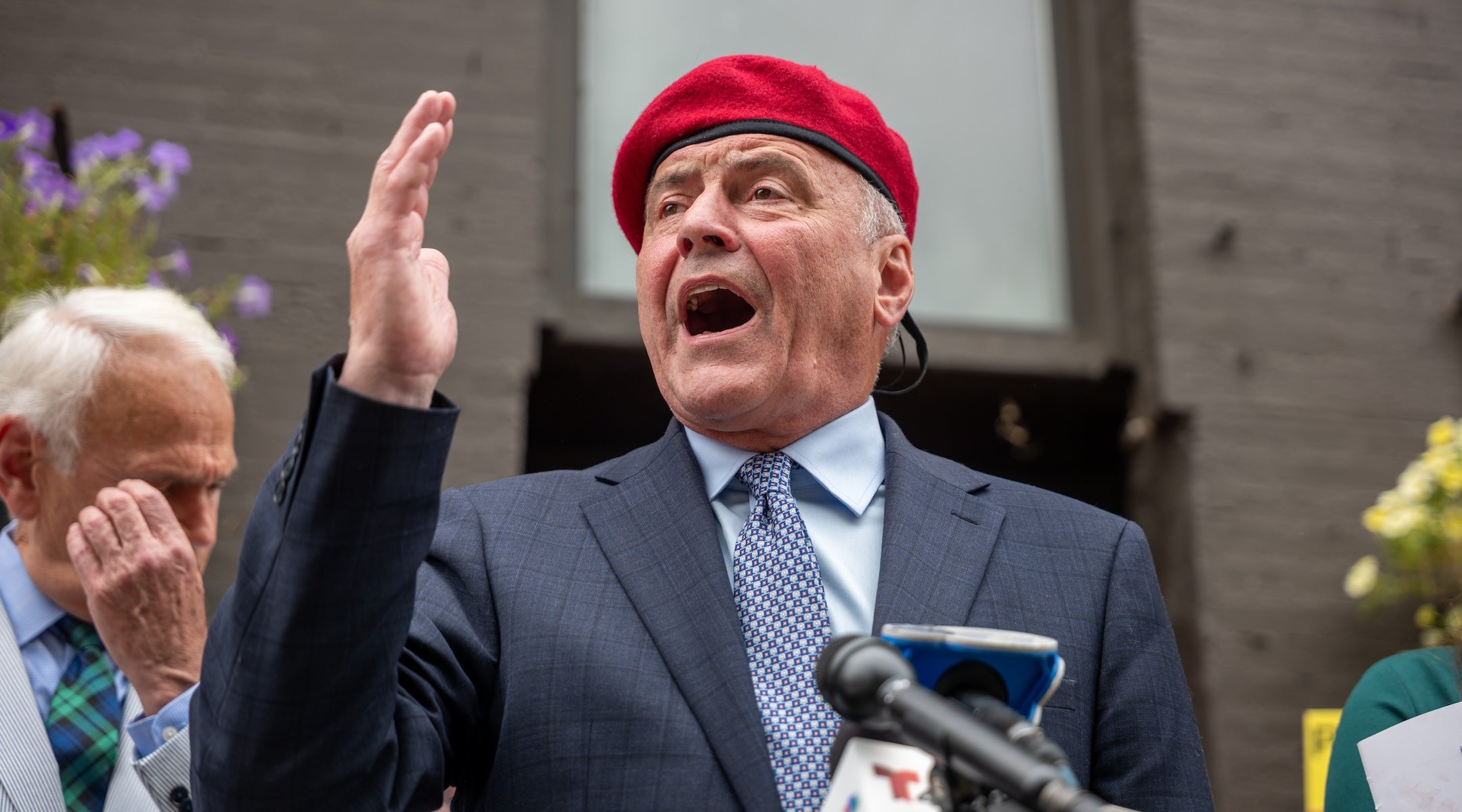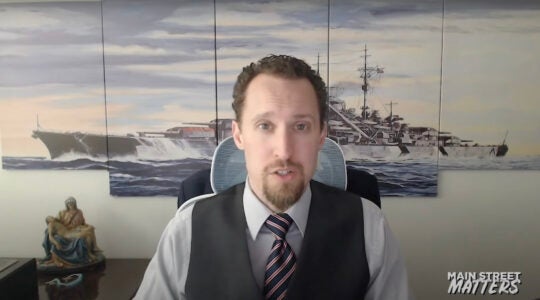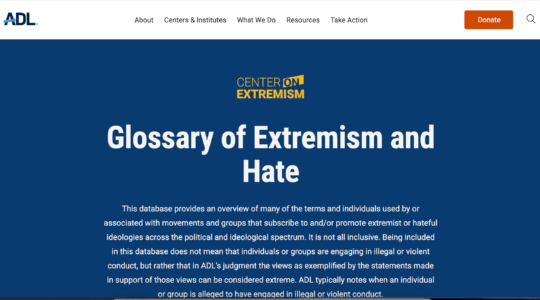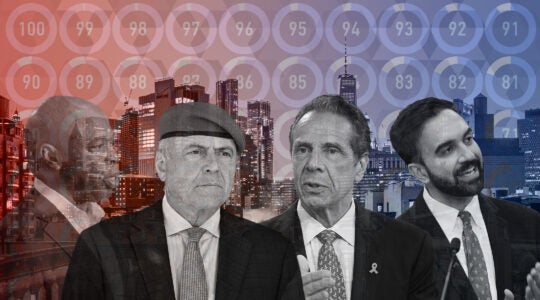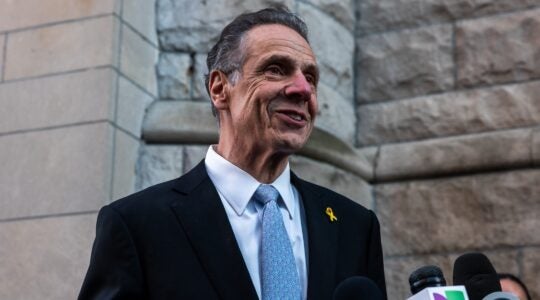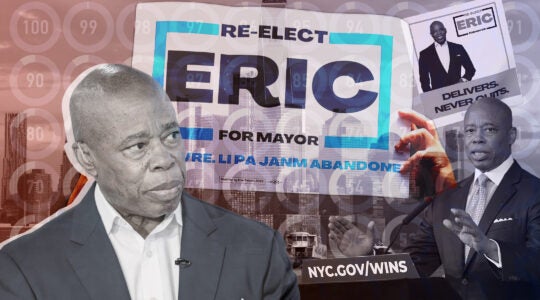Mayoral candidates of all stripes typically seek to convince voters that, under their leadership, the city will ensure public safety for all.
Curtis Sliwa is not typical.
“I, unlike any of the candidates, have said Jews must protect themselves,” Sliwa, the Republican candidate in New York City’s mayor’s race, told the Jewish Telegraphic Agency in a recent interview. “If you depend strictly on Gentiles, history is replete with instances where you’re going to be horribly disappointed.“
He put it more sharply in a July interview with the Queens Jewish Link: “I’m not going to be your Gentile mashiach like Eric Adams and Cuomo tend to,” he said, using the Hebrew or Yiddish word for messiah. “I thought Jewish people were smart. How is it you keep expecting Gentiles to protect you? They have failed you. We’ve never had more antisemitic attacks. Who’s in charge? Gentiles.”
Sliwa’s counterintuitive pitch to Jewish New Yorkers — “Don’t count on me!” — is perhaps one of the less surprising things about the iconoclastic candidate, who stands poised to win over some of Mayor Eric Adams’ supporters after Adams’ exit from the race this week.
After all, long before he ran for public office, Sliwa helmed the Guardian Angels, the group of beret-wearing volunteers that seeks to deter violence by patrolling the streets and subways. Now, his vision for public safety relies in part on the participation of volunteer security groups, including those in Jewish communities.
“I will teach you to defend yourself,” he told the Queens newspaper. “You have Shmira. You have Shomrim. You have Jewish patrols.”
Sliwa has experience working alongside Jewish community patrols and has proudly recalled his efforts with the Guardian Angels to defend the Chabad-Lubavitch community during the 1991 Crown Heights riots. Now, praising the groups as “great, vital volunteer organizations,” he says the Jewish community “should continue leaning into that civilian model.”
But can a greater dependence on volunteer groups keep Jewish New Yorkers safe? How much does Sliwa’s vision really depart from that of his opponents? And what are the drawbacks to relying on volunteers to maintain law and order in New York City?
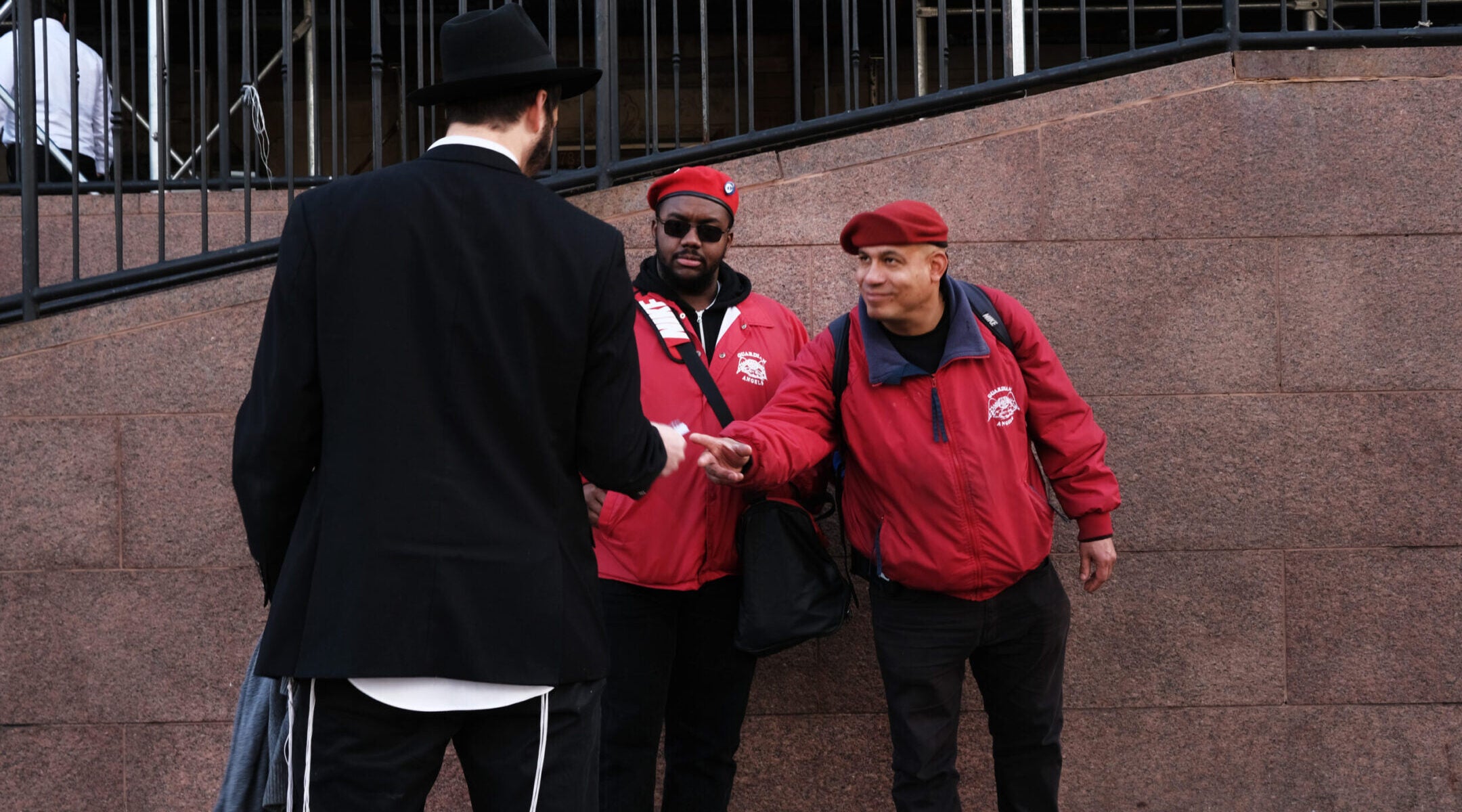
Members of the Guardian Angels patrol in Crown Heights, Brooklyn, on Dec. 31, 2019 after five Orthodox Jews were stabbed at a synagogue on Saturday evening in the upstate New York town of Monsey. (Spencer Platt/Getty Images)
Even some of the groups themselves say Sliwa’s outlook is off-kilter. “I wouldn’t say the need for Shomrim is because of Jews versus Gentiles,” said Rabbi Michael Landau, the founder of a fledgling Manhattan version of the group that has a long track record in Brooklyn.
Landau, who endorsed Adams and now backs Andrew Cuomo, added, “It’s law enforcement that we look to for protecting the Jewish community.”
But Landau said groups like his can play a valuable role in making law enforcement more effective. “When you have an agency like Shmira or Shomrim, who are doing some patrols, ensuring safety and security — everybody’s safer,” he said. “That’s what they call the force multiplier.”
Dov Hikind, the former Assembly member who is Sliwa’s most prominent Jewish ally, said he “could not agree more” with Sliwa’s message to the Jewish community.
“Of course we depend on the New York City police department and on the authorities, he’s not saying we shouldn’t,” Hikind said. “But we need to sometimes play more of a role ourselves.”
Shomrim and Shmira operate mostly in neighborhoods with large Orthodox Jewish populations such as Crown Heights, Borough Park, Williamsburg and Flatbush, with the goal of maintaining safety by being the “eyes and ears of the community,” according to Boro Park Shomrim’s website. Landau’s Manhattan branch of Shomrim recently began operating, in addition to ones in Queens and Staten Island.
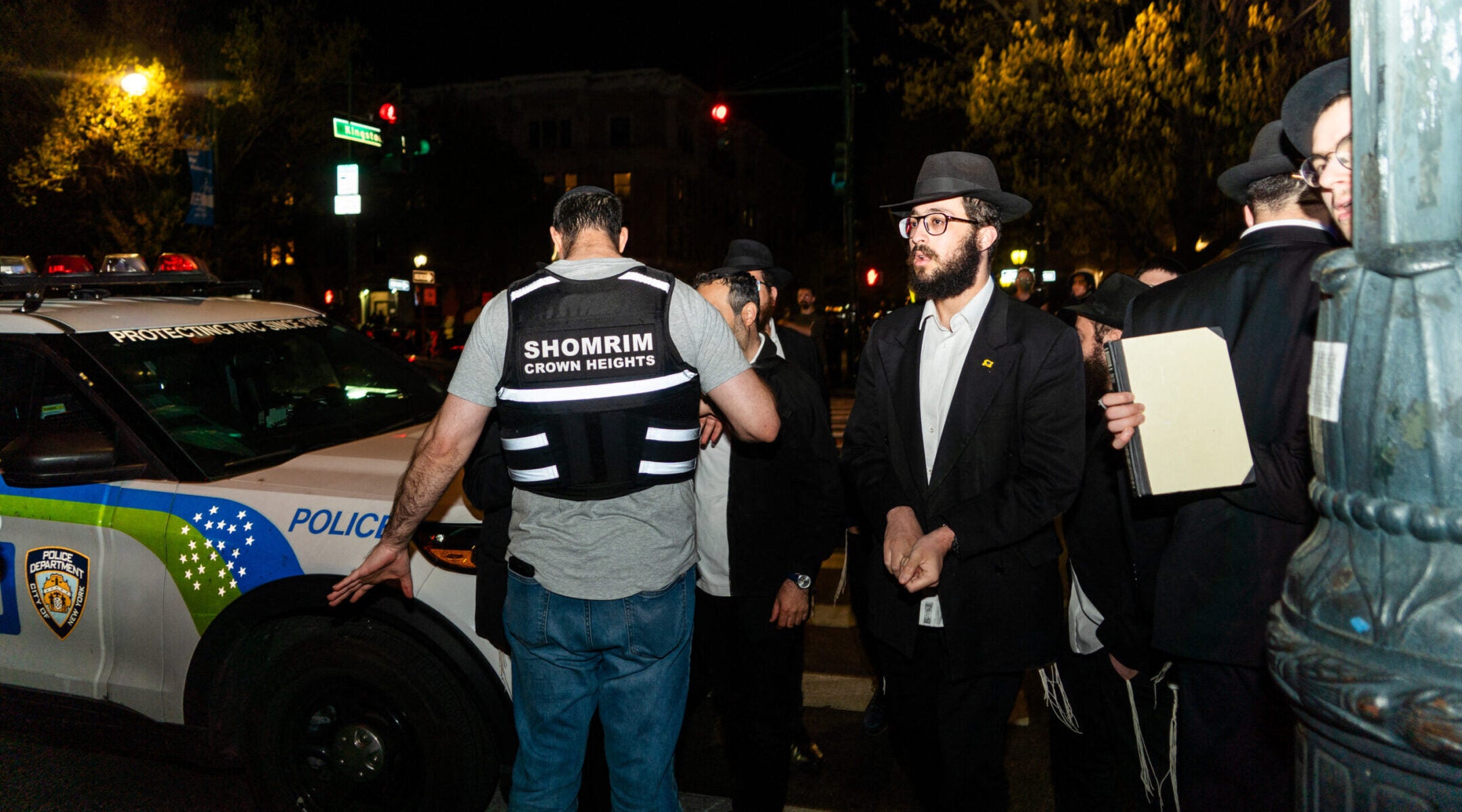
A member of the Crown Heights Shomrim patrol speaks with Orthodox Jewish men near an NYPD vehicle during a protest outside the Chabad Lubavitch World Headquarters in Brooklyn on Aprl 24, 2025. (Madison Swart / Hans Lucas / Hans Lucas via AFP via Getty Images)
Manned entirely by unarmed civilian volunteers with a fleet of marked cars used for patrols, the groups send volunteers to assist police in potentially hostile settings such as protests, and post security outside Jewish institutions and congregations. Within insular Hasidic communities, their emergency hotlines are often the first call before the police department — though they have no arrest power.
Phylisa Wisdom, executive director of the progressive advocacy group New York Jewish Agenda, said simply leaning into those groups would not necessarily bring safety to Jews across the board.
“Jews live all over the city,” she said. “And while that model works really well for certain communities, there are other Jewish communities that have little to no interaction with those volunteer groups.”
To Michael Lesher, a writer and attorney who’s written critically about those volunteer groups, Sliwa’s comments implied that New York City “has no interest in Jews,” and that there are no Jews in the police force. “I’m sorry, that ain’t the case,” he said.
In fact, the NYPD commissioner is a Jewish woman, Jessica Tisch, and Adams noted in his video address announcing his resignation from the race that he had also appointed the first Jewish woman to helm the agency’s intelligence bureau.
All of the men vying to be mayor have proposals for public safety, which New York City voters regularly rate among the top issues motivating them at the ballot box.
Frontrunner Zohran Mamdani, a democratic socialist, has recanted his past calls to defund or shrink the police force. But rather than more police officers, Mamdani says what the city needs is a Department of Community Safety that will deploy mental health outreach workers to subway stations, allowing police to be reallocated in hopes of improving their “response times to serious crimes across the city.”
Cuomo, the former governor running as an independent, plans to add 5,000 new officers over the course of five years.
And Adams, before he dropped out, had recently surged 1,000 additional officers into the Bronx to combat an increase in shootings and murders, while also partnering with the Citizen app to improve public safety communications.
Sliwa has a broad public safety platform centered around a pledge to add 7,000 police officers. The platform also includes targeting gang violence by expanding the NYPD’s Gang Unit, reinstating the department’s Anti-Crimes Unit to “proactively prevent violence,” and increasing officer pay. In his vision, volunteer-led patrol groups would work “in tandem with the police.”
On their own, groups like Shomrim and Shmira are “not enough” to keep the city’s Jewish communities safe, Sliwa said, and police are an important part of the equation. He added, however, that the police department ultimately takes its commands from the mayor — and that the burden on those volunteer groups grows when there is poor coordination between the mayor and NYPD, as he charged has been the case under Adams, whom he criticized as “too involved” in policing.
“The police, obviously they get mixed messages depending on who’s the mayor,” Sliwa said.
Critics of the model said they see ample drawbacks to Sliwa’s vision. Wisdom said focusing on empowering community security groups would fall short not only in protecting the city’s Jewish communities, but also in the grander scheme of public safety.
“We’re really only as safe as our neighbors are as well. And there’s both a moral and strategic reason to be thinking about safety in a broader, communal way,” Wisdom said.
“Of course it makes sense that we would be thinking about our own community’s safety, and the institutions that we enter and where we send our children, and where we congregate,” Wisdom added. But, she said, leaning on volunteer patrol groups “doesn’t sound like it makes us very good neighbors.”
“I’m just not sure that’s a good response for any minority community,” Wisdom said.
Sliwa said he believes that Jewish volunteer patrol groups contribute to wider public safety.
“There’s this perception, because they’re predominantly Orthodox, they’re only going to help their own. No!” Sliwa said. “I’ve been out on the front lines with them with the Guardian Angels. They help Jews, Gentiles, anybody in distress.”
Sliwa’s supporters say other communities can create their own versions of Shomrim, too.
“It’s a very benign thing. If a community’s under attack and they feel they want to internally deal with it — yeah, I’m cool with that,” Hikind said. But he said there was “no comparison” between the dangers facing Jews and other groups.
Lesher said it was a problem that volunteers operate without the accountability that applies to city police.
Indeed, Shmira and Shomrim have been the subject of criticism over the years. Incidents like the 2008 beating of a 20-year-old Black man by a pair of Shmira patrollers, and the 2013 beating of 22-year-old Taj Patterson by a group of haredi Orthodox men that included some members of Shomrim Williamsburg, have fanned racial tensions in Brooklyn neighborhoods.
“Look what happened to Taj Patterson. If cops had done that — and things like that do happen — you would have known what to do,” Lesher said. “You would’ve known how to sue the police force, you could’ve forced them to disclose the identity of the officers involved, you could have pursued civil action, possibly criminal action. Now, it might not work — but there is a process, and it can work.”
In 2022, nine years after his beating, a Brooklyn judge did award Patterson $4.5 million after he sued the Williamsburg Safety Patrol, or Shomrim Williamsburg, and the five men arrested on assault charges. But, Lesher pointed out, the “more practical issue” is actually collecting that money from a private entity.
“If you win against the cops, you can be pretty sure of collecting your judgment, since it’s owed by the government entity that employs the police force,” Lesher said, adding, “I would rather stick with the official system, which has elements of accountability built into it.”
For Mitchell Silber, executive director of the Community Security Initiative of the UJA-Federation of New York and the Jewish Community Relations Council of New York, Sliwa’s vision for security resonates in a scenario — one that polls show is likely — where Mamdani is elected mayor.
Noting that Shomrim already works “hand in glove with the local precincts,” Silber said he viewed groups like it as “creative solutions to fill the gap” if the NYPD is not “permitted or resourced to do its traditional policing job.”
He painted the picture of an NYPD staffed at its current record low numbers and seeking to curb overtime costs, unable or unwilling to respond adequately to situations such as a street protest where Jews feel threatened.
“That’s the consequence of a potential Mamdani mayorship,” he said. “So then, what do you have to counter that? And I think Sliwa is saying that, well, what you do have is you’ve got Shomrim and Shmira groups. And they do provide kind of a community watch, safety patrol function in their neighborhoods.”
For his part, Sliwa said he can already see opportunities for growing Jewish community patrols.
“It’s a great, vital volunteer organization — but more needs to be done,” he said about the private ambulance service Hatzalah.
“For instance, that’s the Orthodox community, but the Conservative and Reform communities don’t really have anything,” Sliwa continued. “They are completely dependent on the elected officials and the police.”
JTA has documented Jewish history in real-time for over a century. Keep our journalism strong by joining us in supporting independent, award-winning reporting.
